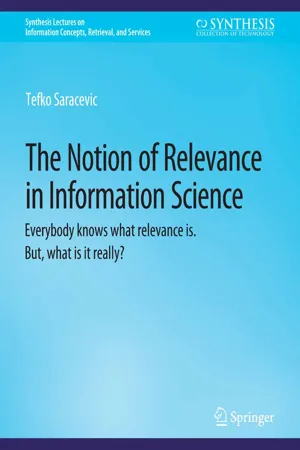
- English
- PDF
- Available on iOS & Android
eBook - PDF
Automated Metadata in Multimedia Information Systems
About this book
Improvements in network bandwidth along with dramatic drops in digital storage and processing costs have resulted in the explosive growth of multimedia (combinations of text, image, audio, and video) resources on the Internet and in digital repositories. A suite of computer technologies delivering speech, image, and natural language understanding can automatically derive descriptive metadata for such resources. Difficulties for end users ensue, however, with the tremendous volume and varying quality of automated metadata for multimedia information systems. This lecture surveys automatic metadata creation methods for dealing with multimedia information resources, using broadcast news, documentaries, and oral histories as examples. Strategies for improving the utility of such metadata are discussed, including computationally intensive approaches, leveraging multimodal redundancy, folding in context, and leaving precision-recall tradeoffs under user control. Interfaces building from automatically generated metadata are presented, illustrating the use of video surrogates in multimedia information systems. Traditional information retrieval evaluation is discussed through the annual National Institute of Standards and Technology TRECVID forum, with experiments on exploratory search extending the discussion beyond fact-finding to broader, longer term search activities of learning, analysis, synthesis, and discovery. Table of Contents: Evolution of Multimedia Information Systems: 1990-2008 / Survey of Automatic Metadata Creation Methods / Refinement of Automatic Metadata / Multimedia Surrogates / End-User Utility for Metadata and Surrogates: Effectiveness, Efficiency, and Satisfaction
Tools to learn more effectively

Saving Books

Keyword Search

Annotating Text

Listen to it instead
Information
Table of contents
- Cover
- Copyright Page
- Title Page
- Preface
- Table of Contents
- Chapter 1 Evolution of Multimedia Information Systems: 1990–2008
- Chapter 2 Survey of Automatic Metadata Creation Methods
- Chapter 3 Refinement of Automatic Metadata
- Chapter 4 Multimedia Surrogates
- Chapter 5 End-User Utility for Metadata and Surrogates: Effectiveness, Efficiency, and Satisfactio
- Chapter 6 Conclusions
- Acknowledgment
- References
- Author Biography
Frequently asked questions
Yes, you can cancel anytime from the Subscription tab in your account settings on the Perlego website. Your subscription will stay active until the end of your current billing period. Learn how to cancel your subscription
No, books cannot be downloaded as external files, such as PDFs, for use outside of Perlego. However, you can download books within the Perlego app for offline reading on mobile or tablet. Learn how to download books offline
Perlego offers two plans: Essential and Complete
- Essential is ideal for learners and professionals who enjoy exploring a wide range of subjects. Access the Essential Library with 800,000+ trusted titles and best-sellers across business, personal growth, and the humanities. Includes unlimited reading time and Standard Read Aloud voice.
- Complete: Perfect for advanced learners and researchers needing full, unrestricted access. Unlock 1.4M+ books across hundreds of subjects, including academic and specialized titles. The Complete Plan also includes advanced features like Premium Read Aloud and Research Assistant.
We are an online textbook subscription service, where you can get access to an entire online library for less than the price of a single book per month. With over 1 million books across 990+ topics, we’ve got you covered! Learn about our mission
Look out for the read-aloud symbol on your next book to see if you can listen to it. The read-aloud tool reads text aloud for you, highlighting the text as it is being read. You can pause it, speed it up and slow it down. Learn more about Read Aloud
Yes! You can use the Perlego app on both iOS and Android devices to read anytime, anywhere — even offline. Perfect for commutes or when you’re on the go.
Please note we cannot support devices running on iOS 13 and Android 7 or earlier. Learn more about using the app
Please note we cannot support devices running on iOS 13 and Android 7 or earlier. Learn more about using the app
Yes, you can access Automated Metadata in Multimedia Information Systems by Michael Christel in PDF and/or ePUB format, as well as other popular books in Computer Science & Computer Networking. We have over one million books available in our catalogue for you to explore.